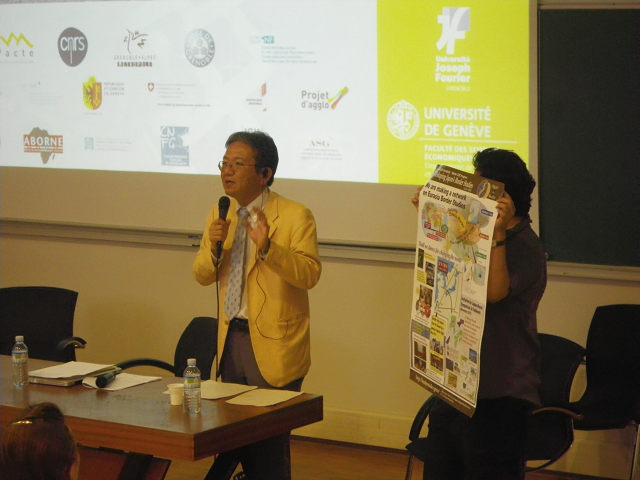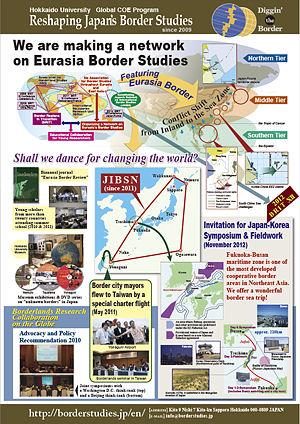|
Speech Proposing the Next BRIT 2012 in Japan and Korea, September 9, 2011, Grenoble, FranceGood evening, ladies and gentlemen. My name is Akihiro Iwashita, and I am currently a professor at Hokkaido University in Japan. I am now in charge of the Global COE program on border studies in Japan and Eurasia. Some of you may have seen our posters on the first and second days in Geneva. My research experiences were mainly obtained in China, Russia, and Central Asia. As you may know, there are excellent organizations and networks on border studies here in Europe and also in North America. They are, for example, the International Boundaries Research Unit (IBRU), the Association of Borderland Studies (ABS) and the Border Regions in Transition (BRIT) network. However, we have few such organizations or networks in Russia and East Asia. To broaden the network to other parts of the globe, our delegation is here with you. I believe through exchanges between Europe and Asia at this year’s BRIT, it has provided us with a wonderful opportunity to broaden our horizons on border studies. My participation in BRIT is relatively new. I joined BRIT the first time at the Victoria-Birmingham/US-Canadian venue several years ago, and I was struck by your border studies network. At the final session in Birmingham, Paul Ganster, a well-known professor from San Diego State University, encouraged me to invite the next BRIT to Asia. As a newcomer, I was reluctant to do so—not to mention that I had made no preparation for such an event at that time. Nonetheless, I made the following promise: I’ll do it in the near future. Three years have passed, and now the time has come. I am prepared to propose the next year's BRIT be held in East Asia for the first time. For that purpose, I invited our colleagues here from Fukuoka, Japan and Busan, Korea. Are there any of the Korea or Japan teams here? If yes, please raise your hand. Now I would like to discuss some details of the conference. The conference venues of day one and day two will be in the city of Fukuoka, Japan. On day three, there will be an excursion by jet-foil to Tsushima Island on the Japan-Korean border. The venue of the fourth and also the final day will be held in Busan, Korea. Hokkaido University will conduct the general management of the programs while Kyushu University (Fukuoka) and Dongseo Univeristy (Busan) will conduct on-site operations with full support from the cities of Fukuoka and Busan. We have already formed the command team as I showed you now. Although the proposed topics to be discussed need further elaboration, they are on: First, comparing maritime and inland borders: their differences, similarities and interactions. The Japan-Korea border region is a good place to begin discussion on these matters because both Japan and Korea share a gateway to the Eurasian continent and both also face the Pacific Ocean. Therefore both countries are able to discuss maritime and inland borders simultaneously. Second, beyond the local border region: For the next BRIT, although we propose the venue to be at the border region of Japan and Korea, we do not limit our discussion to local issues. We have already had several networks on Eurasia. We will organize more sessions on Central Europe, Russia, China, Southeast Asia, Central Asia and so on with the support from our counterparts. As you know, our Japan team covers not only Asia but also parts of Europe. Using the resources in various areas, we can integrate various fields of studies which are related to border research. Moving border studies forward in a more theoretical and comprehensive direction, we believe, is a step in a good direction. Please, let’s share the new expertise together. I have a couple of concrete items for the next BRIT. However, these should be discussed at a later time. Finally, I would like to add one more proposal. BRIT is a good name. However, are border regions still in transition? If so, how long will a border remain in transition? Will it be forever? Also, what is a transition? If a border is no longer in transition and is entering into a new stage, we should adopt a new name like “Border Regions AFTER Transition.” In that case, we could refer to our association as “BRAT” not “BRIT.” I think the time has come for us to begin reconsidering the concept of “transition.” I hope we can discuss this issue in more details soon. Thank you. September 9, 2011 |

